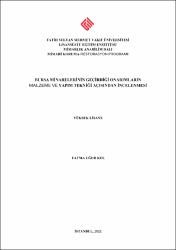Bursa Minarelerinin Geçirdiği Onarımların Malzeme ve Yapım Tekniği Açısından İncelenmesi
Citation
KUL, Fatma UĞUR, Bursa Minarelerinin Geçirdiği Onarımların Malzeme ve Yapım Tekniği Açısından İncelenmesi, Fatih Sultan Mehmet Vakıf Üniversitesi Lisansüstü Eğitim Enstitüsü Mimarlık Anabilim Dalı Mimari Koruma-Restorasyon Programı, Yayımlanmamış Yüksek Lisans Tezi, İstanbul 2021.Abstract
Fethedildiğinde, etrafı sur duvarlarıyla çevrili Hisar’dan ibaret olan Bursa; Orhan Gazi Külliyesiyle Hisar dışına çıkmış, Hüdavendigar, Yıldırım, Yeşil ve Muradiye gibi diğer sultan külliyelerinin yerleşimiyle de doğu-batı aksında gelişmiştir. Şehir içi han, hamam, medrese, tekke ve daha birçok türde anıt ve sivil mimarlık örnekleriyle erken dönem Osmanlı mimarlığına ev sahipliği yapan şehir; bu dönemin üslûbuyla o kadar özdeşleşmiştir ki dönemin diğer örnekleri “Bursa Üslûbu” kavramıyla da tarif edilmektedir.
Bursa’daki tüm anıtlar içerisinde en büyük payı cami ve mescitler oluşturmaktadır. Bursa’ya özgü tabhaneli plan şeması ve küçük tek kubbeli kalkan duvarlı Bursa üslûbundaki camiler ile Ulu Cami dışında çok fazla örneği bulunmayan çok kubbeli camiler şehirdeki önemli anıtları oluşturur. Cami mimarisinin en önemli ögelerinden biri olan minareler üzerinde konum ve biçim itibariyle klasik dönemin anıtsal örneklerine öncülük eden birçok deneme yapılmıştır.
Bu tez kapsamında yapılan çalışmalar altı bölümde değerlendirilmiştir. İlk bölümde tezin amacı, kapsam ve yöntemi ele alınmıştır. Çalışmanın ikinci bölümünde, Bursa’nın tarihsel gelişimine ve sahip olduğu anıtsal ve sivil mimarlık örneklerine kısaca değinilmiş, anıtsal örnekler sayısal verilerin yer aldığı grafiklerle desteklenmiştir. Konuyla ilgili ana kaynaklar taranarak Bursa’daki tüm camilerin listelenmiş, plan tipolojileri ve malzeme-yapım tekniği araştırılmış ve bu veriler grafiklerle desteklenmiştir.
Çalışmanın üçüncü bölümde; minarenin tarihigelişimi, bölümleri ve malzeme-yapım tekniği incelenmiştir. Dördüncü bölümünde ise Bursa minareleri malzeme-yapım tekniği, konum ve biçim özelliklerine göre sınıflandırılmış, sayısal analizler yapılmıştır.
Çalışmanın beşinci bölümünde; bilgi ve belgelerden özgün özellikleri tespit edilen 6 adet camiye ait minarelerin yaşadığı deprem, fırtına gibi afetler, geçmiş dönem onarımları, malzeme ve yapım tekniği incelenmiş, yerinde yapılan gözlem ve ölçümlerle tespitler yapılmış, alınan malzemeler üzerinde çeşitli deneyler yürütülmüştür. Altınca bölümde ise tez kapsamında elde edilen sonuçlar verilmiştir. When it was conquered, Bursa only consisted of a Citadel surrounded by fortifications and the city expanded out of the boundaries of Citadel with Orhan Gazi Complex; it was further developed on the east-west axis with the settlement of other sultans’ complexes such as Hüdavendigar, Yıldırım, Yeşil and Muradiye Complexes. The city, which is home to the early period of Ottoman architecture with its inner-city inns, baths, madrasahs, dervish lodges and many other monuments and civil architecture examples, is so identified with the style of this period that other examples of the period are also described with the concept of “Bursa Style”.
Among all these monuments built in Bursa, mosques and masjids constitute the largest share. With their “tabhane” plan scheme unique to Bursa, mosques with small single-domed were largely stripped of the Seljuk influence, and new types of mosques emerged. Seljuk influence showed itself in multi-domed mosques, which do not have many representatives other than the Ulu Mosque in Bursa. Minarets, one of the most important elements of mosque architecture, entered the period of searching for their personality in Bursa in the 14-15th centuries and in this regard many attempts have been made in terms of location and format. With these attemps, the Ottoman minaret made a great leap forward and pioneered the monumental examples of the classical period.
The studies carried out within the scope of this thesis are evaluated in six chapters. In the first chapter, the aim, scope and method of the thesis are discussed. In the second part of the study, the historical development of Bursa and its monumental and civil architecture examples are briefly mentioned, and monumental examples are supported with graphics containing numerical data. Using the main sources, a list of all mosques in Bursa has been drawn up and their plan typologies, materials and construction technique are researched and supported by numerical data.
In the third part of the study, the historical development of the minaret, its parts and the material-making technique were examined. In the fourth part, the Bursa minarets, which are listed, are classified according to their material-construction technique, location and form, and numerical analyzes were made. In the fifth part of the study, effects of disasters such as earthquakes and storms and past repairs of 6 minarets, whose original features were determined from the information and documents, are investigated in terms of materials and construction techniques, with on-site examinations and measurements. In the sixth chapter, the results obtained within the scope of the thesis are given.



















